Select Language
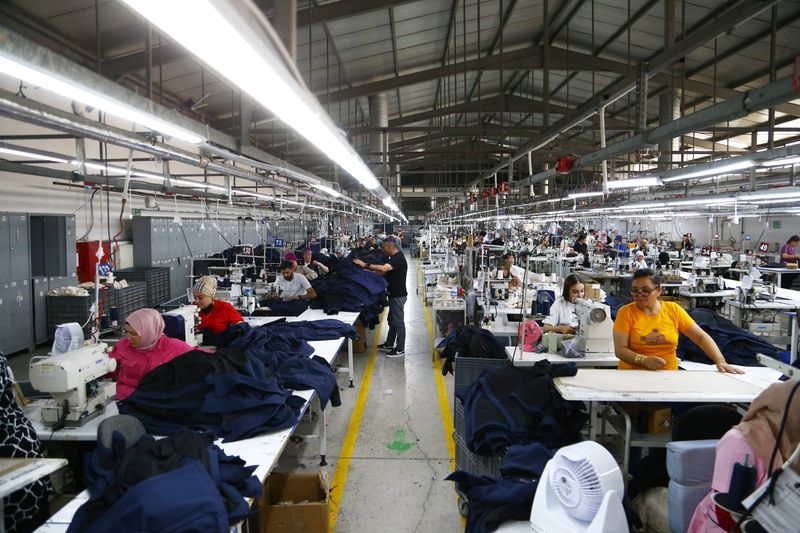
ISTANBUL (Reuters) -Turkey's economy will grow 3% this year and next, lower than the government's recently updated forecasts, a Reuters poll of economists showed on Monday, pointing to a much deeper slowdown as authorities seek to douse rampant inflation.
Poll respondents also unanimously agreed the central bank would hold its key interest rate at 50% on Thursday, but eventually ease policy by 250 basis points by year-end.
Ankara launched its tightening drive in mid-2023 to reverse a years-long low-rates strategy championed by President Tayyip Erdogan to boost economic growth.
The central bank has since raised rates by 4,150 basis points, while the government adopted tax and savings measures meant to rebalance the economy and leave behind a series of currency crisis and price rises.
The drive to cool prices is expected to lower gross domestic product growth to average 3% this year and next, according to the median of 42 economists in the Oct. 8-14 Reuters poll.
That compares to the government's prediction of 3.5% GDP growth this year and 4% next year, in its three-year policy roadmap. The economy grew 4.5% in 2023.
GDP will rise 3.6% in 2026, the poll's median showed.
Natixis said the government had kept its promise of orthodox economic policies and announced fiscal consolidation and budget measures that had further squeezed growth and helped the central bank tackle inflation.
"The impact from a much tighter policy mix on economic activity is, indeed, seen via a number of indicators ... Recession is not yet on the table though as we anticipate a slowdown in the real GDP growth," the investment management firm said.
The central bank will announce its interest rate decision at 1100 GMT on Oct. 17.
In the poll, economists predicted it would not significantly ease policy until next year. The bank was forecast to have reduced rates by 20 percentage points to 30% by end-2025.
Economists expect the policy rate to fall to 42.5% in the first quarter of next year and to 35.0% in the second quarter, based on the median response. They expect the cutting cycle to be completed in the third quarter of next year, leaving the policy rate at 30.0%.
Tight policy, fiscal measures and base effects brought inflation down to 49.38% in September from a recent peak of 75.45% in May.
The poll median showed economists expect inflation to fall to 43.5% this year and to 25.2% by the end of 2025. The government forecasts annual inflation will fall to 41.5% in 2024 and 17.5% next year.
Turkey's current account deficit in 2024 is expected to be 1.8% of GDP this year and next, the median forecast showed, compared to a government forecast of 1.7% and 2.0% respectively.
(Other stories from the October Reuters global economic poll)
(Polling by Indradip Ghosh and Mumal Rathore; Writing by Ezgi Erkoyun; Editing by Jonathan Spicer and Alison Williams)
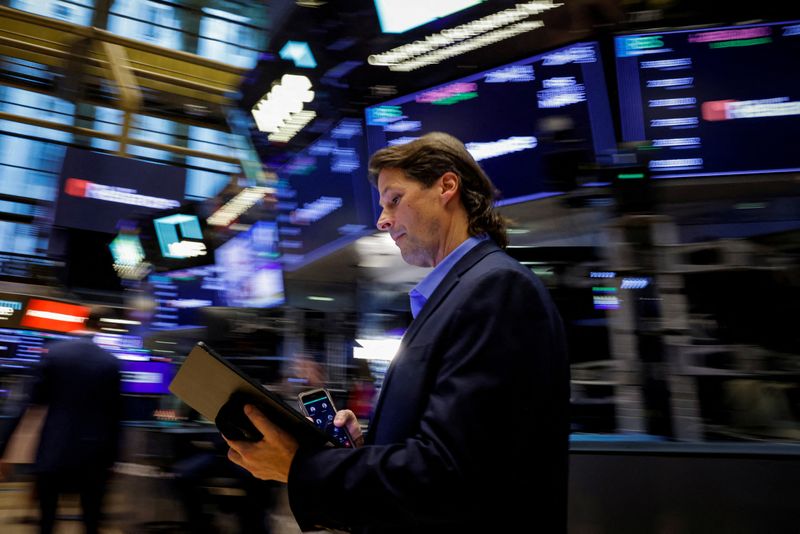
By Stella Qiu
SYDNEY (Reuters) - Asian stocks were mostly higher on Tuesday, supported by a strong Wall Street close and investor optimism about corporate earnings, while the dollar held near a two-month top, aided by bets on a smaller U.S. rate cut next month.
Oil prices are down about 3% after Israeli Prime Minister Benjamin Netanyahu reportedly told the United States that Israel is willing to strike Iranian military targets and not nuclear or oil ones, easing immediate concerns about supply disruptions. [O/R]
The Nikkei rallied 1% to a three-week peak, having been closed on Monday for a holiday. MSCI's broadest index of Asia-Pacific shares outside Japan edged up 0.2% as gains in Taiwan and Australia were partly offset by a drop in Chinese markets.
China's blue chips fell 0.4%, while Hong Kong's Hang Seng index slipped 0.3% as a lack of new stimulus details from Beijing left investors wanting for more.
Local media reported that Beijing may raise an additional 6 trillion yuan ($850 billion) from Treasury bonds over three years to help bolster a sagging economy.
"China's signal on policy stimulus prompted us to go modestly overweight, especially given depressed valuations. Details have been scant, so we could change our view if future announcements disappoint," said analysts at BlackRock (NYSE:BLK) Investment Institute.
"We still like U.S. stocks and the broad AI theme as corporate earnings growth expands beyond tech. Yet fears over stretched valuations can drive brief selloffs. This calls for considering global exposure where we see cheap valuations and potential catalysts."
Overnight, the S&P 500 and Dow roared to record high closes, led by chip stocks after a 2.4% jump in AI darling Nvidia (NASDAQ:NVDA) and a brisk start to the third-quarter earnings season with beats by JP Morgan and Wells Fargo.
Other big banks including Citi, Bank of America and Goldman Sachs will report quarterly results on Tuesday.
In the foreign exchange market, the dollar slipped 0.2% to 149.50 yen, pulling back from a 2-1/2-month high of 149.98 overnight. The euro held at $1.0906, up off the 10-week trough overnight, ahead of a rate decision from the European Central Bank on Thursday.
The dollar has been buoyed by conviction the Federal Reserve will choose a smaller 25 basis point rate cut next month, rather than a 50 bp move, given the economy continues to grow without overheating.
Fed Governor Christopher Waller on Monday called for "more caution" on interest-rate cuts ahead, while Fed Minneapolis President Neel Kashkari sees more modest rate cuts ahead.
Traders are pricing in about an 88% probability the Fed will cut rates by 25 basis points next month and a 12% chance it would leave rates unchanged, according to CME's FedWatch.
The U.S. bond market was shut for a holiday on Monday, but cash Treasuries fell slightly in early Asia trade. Two-year Treasury yields are up 1 basis point to 3.9533%, while 10-year yields climbed 2 bps to 4.0885%.
Oil extended its declines for a third straight session on demand concerns and as the jitters about Israel's attack on Iran calmed. Brent futures fell 2.9% to $75.22 a barrel, having dropped 2% overnight.
Gold was 0.1% lower at $2,648.57 an ounce.
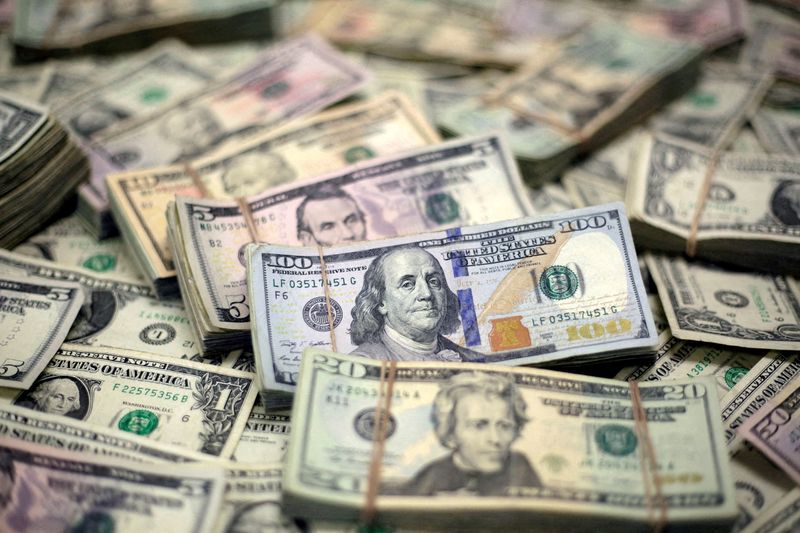
By Ankur Banerjee
SINGAPORE (Reuters) - The U.S. dollar was perched at an over two-month high against major currencies on Tuesday, spurred by wagers the Federal Reserve will proceed with modest rate cuts in the near term, while the yen inched closer to the key 150 per dollar level.
The euro was steady in early Asian hours but close to its lowest level since Aug. 8 that it touched on Monday ahead of the European Central Bank policy meeting on Thursday, where the central bank looks set to deliver another interest rate cut.
A string of U.S. data has shown the economy to be resilient and slowing only modestly, while inflation in September rose slightly more than expected, leading traders to trim bets on large rate cuts from the Fed.
The U.S. central bank kicked off its easing cycle with an aggressive 50 basis points at its last policy meeting in September. Traders are now ascribing 89% chance of a 25 bps cut in November, with 45 bps of easing priced in for the year.
The dollar index, which measures the U.S. currency against six rivals, was last at 103.18, just shy of 103.36, the highest level since Aug. 8 it touched on Monday. The index is up 2.5% and on course to snap its three-month losing streak.
The dollar got a lift after Fed Governor Christopher Waller on Monday called for "more caution" on interest rate cuts ahead, citing recent economic data.
"Whatever happens in the near term, my baseline still calls for reducing the policy rate gradually over the next year," Waller said.
Recent hurricanes and a strike at Boeing (NYSE:BA) could make job market readings difficult, stripping perhaps more than 100,000 from monthly job gains in October, Waller estimated. The next non-farm payrolls (NFP) data is due in early November.
"Most knew that recent disruptions would result in the NFP print being a messy affair, but Waller's comment goes some way in quantifying the sort of disruption we can expect," said Chris Weston, head of research at Pepperstone.
"Essentially, with the next NFP so distorted, the market won't have the same level of control in pricing risk into the November FOMC meeting."
The dollar's rise in the past few weeks has pushed the yen lower, especially after a dovish shift in rhetoric from Bank of Japan Governor Kazuo Ueda and surprising opposition to further rate hikes by new Prime Minister Shigeru Ishiba.
That has cast doubts over when Japan's central bank will next tighten policy.
The yen last fetched 149.55 per dollar in early trading, having touched a 2-1/2 month high of 149.98 on Monday when Japan was closed for a holiday. It last hit the 150 level on Aug. 1.
Meanwhile, the Australian dollar was steady at $0.67275, while the New Zealand dollar was 0.13% lower at $0.6089. The euro last bought $1.090825.
China's offshore yuan was little changed at 7.0935 per dollar after Caixin Global reported China may raise an additional 6 trillion yuan ($850 billion) from Treasury bonds over three years to help bolster a sagging economy through added fiscal stimulus.
Tony Sycamore, market analyst at IG, said the market now appears to be taking the view that fresh stimulus measures are on the horizon, possibly at the China National People's Congress standing committee meeting later this month.
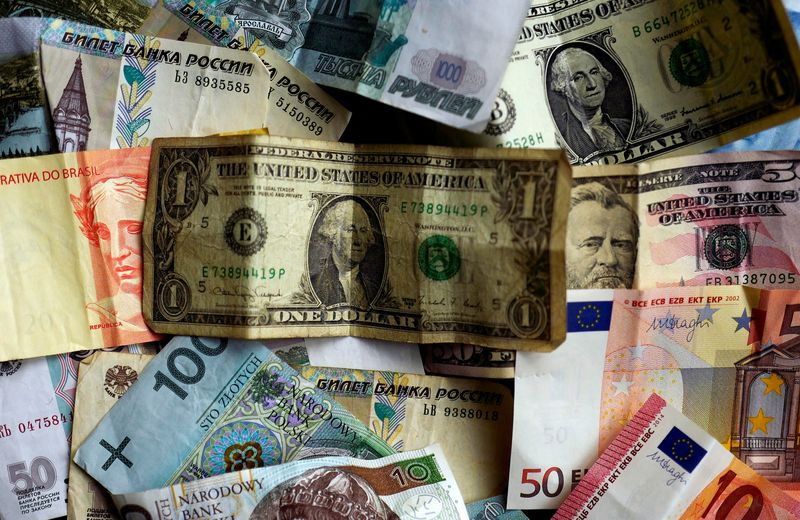
By Libby George
LONDON (Reuters) - Countries are likely to default more frequently on their foreign currency debt in the coming decade than they did in the past due to higher debt and an increase in borrowing costs, agency S&P Global Ratings warned in a report on Monday.
Sovereigns' credit ratings overall have also weakened globally in the past decade.
The report's findings are a stark warning as the world exits a punishing round of sovereign debt defaults - even as wealthy creditor nations said earlier this year that the risk of debt crisis that has weighed on the world was beginning to recede.
"These factors quickly create liquidity challenges as access to financing dries up and capital flight accelerates," the report said. "In many cases, this constitutes the tipping point where liquidity and solvency constraints become problematic for a government."
The COVID-19 pandemic in 2020 strained state finances, and there were seven instances of countries defaulting on their foreign currency debt - Belize, Zambia, Ecuador, Argentina, Lebanon and Suriname twice.
A spike in food and fuel prices after Russia's February 2022 invasion of Ukraine piled on more pressure, and eight more countries defaulted in 2022 and 2023, including both Ukraine and Russia.
The combined number of defaults since 2020 amounts to more than a third of the 45 sovereign foreign currency defaults since 2000.
S&P Global Ratings analysed defaults over the past two decades and found that developing countries are now relying more heavily on government borrowing to ensure foreign capital inflows. But when that reliance was paired with unpredictable policies, a lack of central bank independence and shallow local capital markets, trouble repaying often followed.
Higher government debt and fiscal imbalances prompted capital flight, which in turn intensified balance-of-payment pressures, depleted foreign exchange reserves and eventually cut off their ability to borrow - essentially a doom spiral that led to default.
It also warned that debt restructurings are taking significantly longer now than in the 1980s - with big consequences.
"We also found that the long-term macroeconomic consequences are more severe for sovereigns that remain in default for multiple years, increasing the probability of further defaults down the line," it said.
Interest payments in soon-to-default countries tended to approach or even exceed 20% of government revenue in the year before default, and the countries also typically entered recession, while inflation rose to double digits, making life tougher for people there.
"Sovereign defaults have significant implications for economic growth, inflation, exchange rates, and the solvency of a sovereign's financial sector," the report said.
(This story has been corrected to fix the dateline to Oct. 14, not Oct. 7)
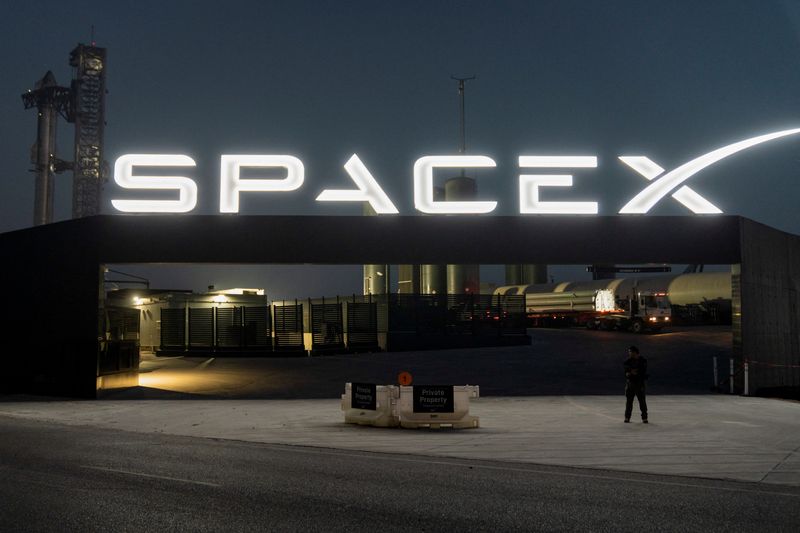
By David Shepardson
WASHINGTON (Reuters) -The Federal Aviation Administration approved a license on Saturday for the launch of SpaceX's Starship 5 set for Sunday after earlier saying it did not expect to make a decision until late November.
Reuters first reported this week the faster than expected timetable after the FAA in September had suggested a much longer review.
SpaceX is targeting Sunday for the launch and said a 30-minute launch window opens at 7:00 a.m. CT (1200 GMT)
The FAA said on Saturday SpaceX had "met all safety, environmental and other licensing requirements for the suborbital test flight" for the fifth test of the Starship and has also approved the Starship 6 mission profile.
The Starship spacecraft and Super Heavy rocket are a fully reusable system designed to carry crew and cargo to Earth orbit, the Moon and beyond.
The fifth test flight of the Starship/Super Heavy from Boca Chica, Texas, includes a return to the launch site of the Super Heavy booster rocket for a catch attempt by the launch tower, and a water landing of the Starship vehicle in the Indian Ocean west of Australia.
The FAA said if SpaceX chooses an uncontrolled entry "it must communicate that decision to the FAA prior to launch, the loss of the Starship vehicle will be considered a planned event, and a mishap investigation will not be required."
On Friday, the FAA approved the return to flight of the SpaceX Falcon 9 vehicle after it reviewed and accepted the SpaceX-led investigation findings and corrective actions for the mishap that occurred Sept. 28.
SpaceX CEO Elon Musk has harshly criticized the FAA, including for proposing a $633,000 fine against SpaceX over launch issues and for the delay in approving the license for Starship 5, which the company says has been ready to launch since August. Musk has called for the resignation of FAA Administrator Mike Whitaker and threatened to sue the agency.
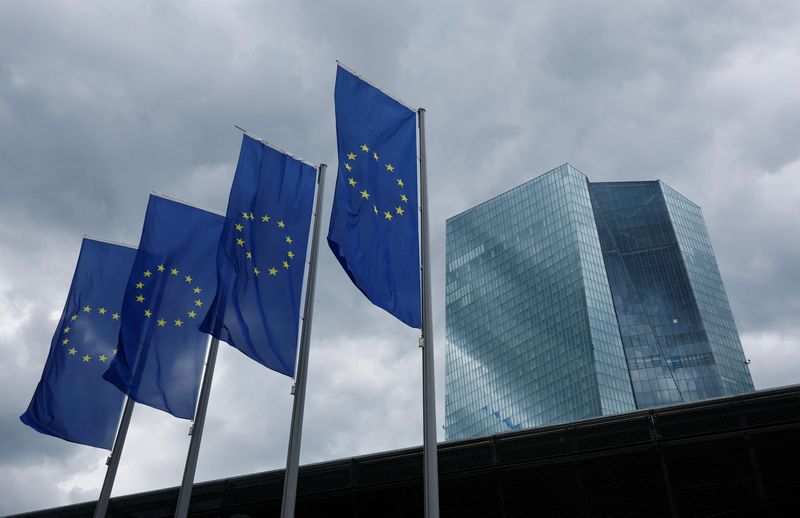
By Yoruk Bahceli and Stefano Rebaudo
(Reuters) - The European Central Bank looks set to deliver another interest rate cut on Thursday it had little appetite to point to just weeks ago.
Data signal a euro zone economy in worse shape than when policymakers last met, boosting bets on speedier rate cuts than the quarterly pace June and September cuts suggested.
"If the ECB does not cut in October, the market will think that the central bank is behind the curve and potentially making a policy error," said Deutsche Bank chief European economist Mark Wall.
Here are five key questions for markets:
1/ Will the ECB cut rates this week?
All but certainly. Traders are banking on around a 90% chance of a 25 basis-point cut, a huge increase from as low as 20% when the ECB met last month.
Euro zone business activity that unexpectedly contracted in September led to a surge in October bets, as investors feared that the ECB, so far sticking to its data-dependency mantra, may not cut rates quickly enough.
Several policymakers have already made the case for an October cut. Even ECB chief Christine Lagarde has hinted at one, saying confidence in falling inflation would be reflected in the bank's decision.
2/ Is this the start of back-to-back rate cuts?
Yes, Wall Street economists reckon.
And traders are pricing in just over three cuts at the four meetings following October.
ECB policymakers, however, are not quite there yet. Centrist Finnish governor Olli Rehn has repeated the message that the pace and scale of further cuts will be decided meeting by meeting.

(Reuters) - Goldman Sachs raised China's gross domestic product forecast to 4.9% from 4.7% for 2024, according to a research note, citing the government's latest round of stimulus measures.
The move "clearly indicates that policymakers have made a turn on cyclical policy management and increased their focus on the economy," said Goldman Sachs in a research note to clients on Sunday.
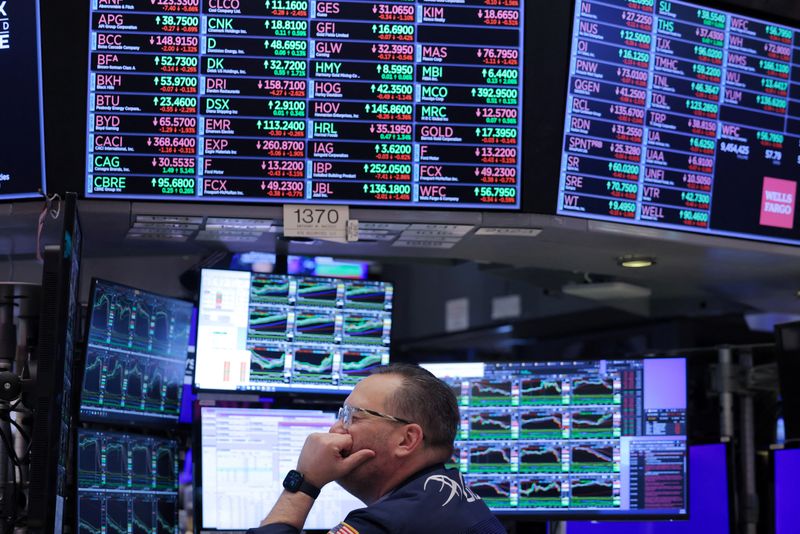
Investing.com -- Earnings results and U.S. retail sales numbers will be closely watched in the week ahead for indications on the strength of the economy and what that could mean for Federal Reserve interest rates. The European Central Bank is expected to deliver another quarter point rate cut, while China will publish figures on third quarter growth. Meanwhile, oil prices look set to remain volatile and demand disruptions and elevated geopolitical tensions. Here's your look at what's happening in markets for the week ahead.
1. Q3 earnings
Earnings season got underway on Friday, with shares of JPMorgan (NYSE:JPM) and Wells Fargo (NYSE:WFC) jumping after both banks surpassed estimates.
More big banks are due to report in the coming week, including Bank of America (NYSE:BAC) and Citigroup (NYSE:C) on Tuesday, while Netflix (NASDAQ:NFLX) is due to report after the close on Thursday.
Investors will be closely watching results from Netflix - specifically whether the streaming service is adding or losing customers and at what pace - for insights into the health of consumer spending.
Companies will need to top expectations for profit growth in their quarterly reports to support the stock market's valuation, which stands well above its historical average.
Third quarter earnings results should confirm that large-cap corporate profit growth remains solid, analysts at UBS said in a note on Friday. "Now that the Fed has started its rate-cutting cycle, the economy should get a further boost from lower interest rates on things like credit card debt and business loans."
2. U.S. data, Fedspeak
Markets will get another update on the health of the U.S. consumer on Thursday, with investors hoping retail sales data will offer further insight into an economy that is turning out to be far more resilient than many had expected.
Recent stronger-than-forecast labour market data prompted investors to reevaluate bets on how deeply the Fed will need to cut rates in coming months and a healthy retail sales print could further amplify that trend, offering evidence of strength in an important pocket of the world's largest economy.
Investors will also get a chance to hear from a handful of Fed officials in the coming days, including Governor Christopher Waller, Minneapolis Fed President Neel Kashkari and San Francisco Fed President Mary Daly.
3. ECB rate cut
The ECB is set to deliver another quarter-point rate cut on Thursday, a move policymakers and market watchers had all but ruled out after the bank’s last meeting in September.
Since then, indications that economic growth is slowing and price pressures are easing have increased the need for faster cuts to support the bloc’s economy.
Some analysts reckon Thursday's move could kick off back-to-back rate cuts.
Cutting again in October will be significant, analysts at Deutsche Bank said in a note on Friday. “As the first back-to-back cut of the cycle, it would signal a pivot into a faster easing cycle. Nevertheless, the high level of macro uncertainty means that despite the pivot, we are not expecting the ECB to move away from the 'data dependent, meeting by meeting' approach to policy.”
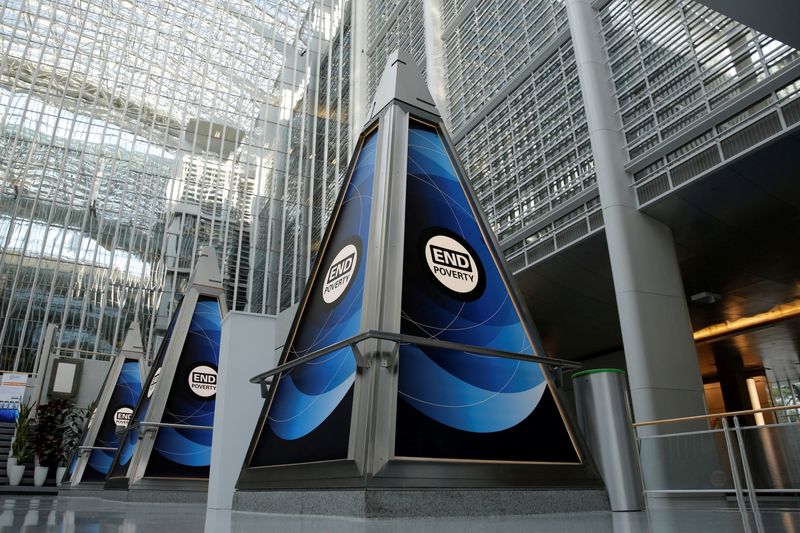
By David Lawder
WASHINGTON (Reuters) - The world's 26 poorest countries, home to 40% of the most poverty-stricken people, are more in debt than at any time since 2006 and increasingly vulnerable to natural disasters and other shocks, a new World Bank report showed on Sunday.
The report finds that these economies are poorer today on average than they were on the eve of the COVID-19 pandemic, even as the rest of the world has largely recovered from COVID and resumed its growth trajectory.
Released a week before World Bank and International Monetary Fund annual meetings get underway in Washington, the report confirms a major setback to efforts to eradicate extreme poverty and underscores the World Bank's efforts this year to raise $100 billion to replenish its financing fund for the world's poorest countries, the International Development Association (IDA).
The 26 poorest economies studied, which have annual per-capita incomes of less than $1,145, are increasingly reliant on IDA grants and near-zero interest rate loans as market financing has largely dried up, the World Bank said. Their average debt-to-GDP ratio of 72% is at an 18-year high and half of the group are either in debt distress or at high risk of it.
Two thirds of the 26 poorest countries are either in armed conflicts or have difficulty maintaining order because of institutional and social fragility, which inhibit foreign investment, and nearly all export commodities, exposing them to frequent boom-and-bust cycles, the report said.
"At a time when much of the world simply backed away from the poorest countries, IDA has been their lifeline," World Bank chief economist Indermit Gill said in a statement. "Over the past five years, it has poured most of its financial resources into the 26 low-income economies, keeping them afloat through the historic setbacks they suffered."
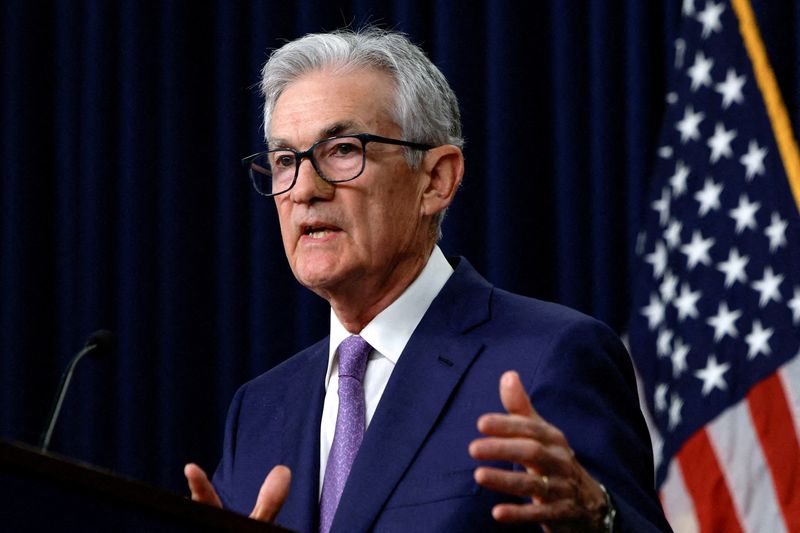
Investing.com -- The Federal Reserve's upcoming November 6-7 meeting is likely to see a stronger stance from monetary policy hawks, Yardeni Research strategists said in a note, as September’s inflation data came in hotter than anticipated.
This challenges the position of Fed Chair Jerome Powell and other dovish members of the Federal Open Market Committee (FOMC), who delivered a 50 basis point rate cut last month amid concerns about a slowing economy. Yardeni strategists note their credibility has been weakened, especially after the latest jobs report showed a further drop in the unemployment rate and record-high payrolls.
“Today’s CPI data support our story that the Fed shouldn't cut the federal funds rate (FFR) at its two remaining meetings this year,” strategists said in a Thursday note.
Bond market signals appear to align with this outlook. Since the Fed’s 50-basis-point rate cut on September 18, the 10-year Treasury yield has climbed from 3.63% to 4.11%, reflecting rising inflation expectations.
Stocks, meanwhile, have only slightly dipped from the new record highs reached yesterday. Yardeni believes that any further rate cuts “would increase the odds of a stock-market melt-up.”
The research firm highlighted several key data points from the latest CPI report, explaining why the Fed may need to halt its dovish shift.
In late 2022, Fed Chair Jerome Powell stressed the importance of supercore inflation (core services inflation excluding housing) in predicting future core inflation trends. Thursday’s CPI report showed that supercore CPI inflation has inched up from 4.3% to 4.4% year-over-year, a “far cry from 'mission accomplished’,” Yardeni says.

